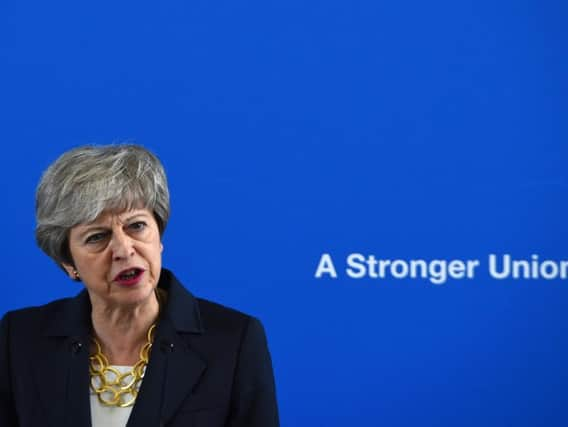Theresa May takes a parting shot at SNP


Bute House was one of Mrs May’s first stops after she became Prime Minister back in July 2016. Afterwards she said it had been “an excellent meeting” and she looked forward to future “constructive and positive discussions”.
Ms Sturgeon, for her part, said they shared “a businesslike way of doing things” and added: “I think we can find a way of working together.”
Advertisement
Hide AdAdvertisement
Hide AdBut any idea of closer co-operation or finding common ground quickly vanished. The SNP’s proposals for finding the least-damaging Brexit were ignored and where David Cameron had negotiated an agreement to allow the 2014 independence referendum, Mrs May refused even to discuss calls for a second vote.
And now, making her farewell visit to Scotland before she steps down as Prime Minister in a couple of weeks, Mrs May singled out the SNP for attack.
In an otherwise fairly bland speech reciting the benefits of the Union, she declared: “Over the last three years I have learned that while other parties can be relied on to work with the UK Government in good faith to make devolution a success, an SNP Scottish Government will only ever seek to further the agenda of separation.”
Mrs May also announced a review to be led by former Scotland Office minister Andrew Dunlop into how UK government departments can strengthen the Union after 20 years of devolution. Since she will no longer be around by the time a report is produced, she added that both Boris Johnson and Jeremy Hunt supported the move.
Advertisement
Hide AdAdvertisement
Hide AdThe review may revive fears of a more activist approach by Westminster over policies north of the border, sparked by an earlier speech from the Prime Minister when she said: “For too long the attitude in Whitehall has been to ‘devolve and forget’. The UK Government exercises a responsibility on behalf of the whole UK that transcends party politics and encompasses all aspects of our national life.”
And comments by the two Tory leadership contenders suggest Messrs Johnson and Hunt would both take the same hard line as Mrs May in blocking any move to hold second independence referendum.
This in turn has provoked SNP MP Angus MacNeil and national executive member Chris McEleny to propose their party should consider another route to independence. Their motion to the SNP conference in October suggests that if the UK Government will not agree to a new referendum, an election where voters returned a majority of independence-supporting MPs or MSPs should be taken as a mandate to start negotiating independence. It would take the party back to the position it held prior to the decision in 2000 to promise a referendum before making any attempt at independence. That change allowed voters with reservations about going it alone to back the SNP anyway and helped the party to win power.
To drop the requirement for a referendum now could look like rewriting the rules. But it is a measure of the stubbornness Mrs May seems to have established as accepted policy that the SNP might consider it.
After three years in Downing, Street Mrs May’s main legacy is unfinished Brexit. But she also leaves behind a Union more on the brink and fewer doors open for discussion.